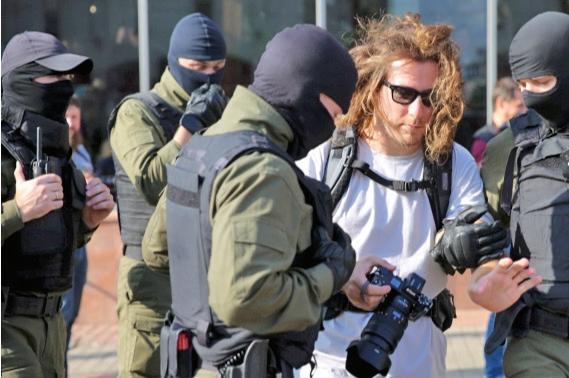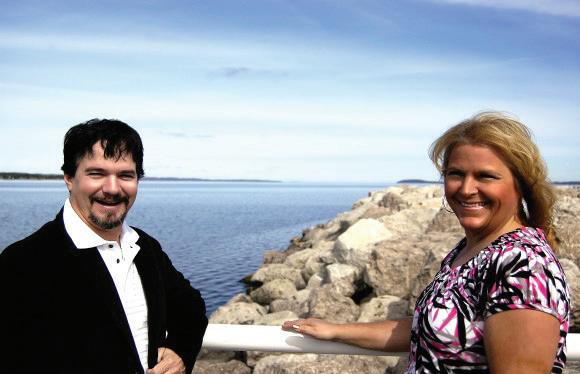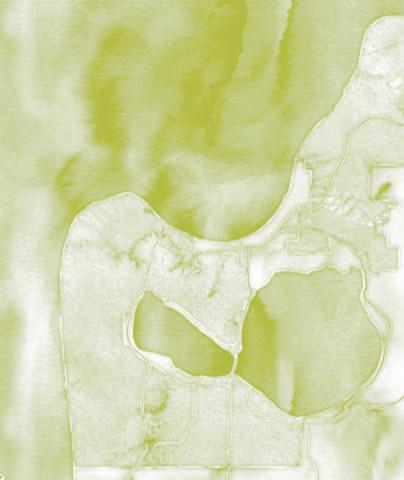
12 minute read
Truth vs. the World
Press freedom fighter Dr. Courtney Radsch to talk fake news, media, and global threats to democracy
By Craig Manning
Tell the truth. A journalist’s job can be summed up in those three small words. It sounds like the simplest thing in the world.
Dr. Courtney Radsch knows better.
She knows how, when government interests clash with the truth, it’s often the journalists who pay — sometimes with their lives. She knows what it’s like to be on the receiving end of the hateful online abuse that many journalists — especially women — deal with on a day-to-day basis, a side effect of doing their jobs. And she knows that, in an age of misinformation and anti-press rhetoric, it might just fall to journalists to save our democracies, protect our freedoms, and foster transformative change. So far, Radsch’s career in journalism has taken her from the Middle East to Paris to a stint with the New York Times. She was on the ground in Egypt in the early 2000s, working on her Ph.D. and monitoring the rise of cyberactivism and citizen journalism in the country — trends that eventually led to the Arab Spring. In 2008, she took a job in Dubai with Al Arabiya, a Saudi-owned television channel, to oversee an expansion of the network’s English-language websites. She lost that job the following year, after publishing a report about safety issues with Emirates — an airline with ties to Dubai’s ruling family. “They wanted to introduce original reporting into the English language websites, [and] they brought me on to do that,” Radsch said of the Al Arabiya job. “And then they discovered that original reporting comes with uncomfortable subject matter. I got fired for an article I wrote and kicked out of the country.” Radsch will address northern Michigan locals at 7pm April 15 as part of the current Northwestern Michigan College International Affairs Forum series. The virtual event, titled “Protecting Press Freedom Globally and Locally,” will touch upon global threats to press freedom, the role of technology in modern journalism, and the steps people can take to support journalists in a fraught moment for the profession.
Northern Express caught up with Radsch to learn more about her current role as advocacy director for the Committee to Protect Journalists (CPJ), and about her views on the current state of media, journalism, and truth.
Northern Express: What does CPJ do, and what does your role entail?
Dr. Courtney Radsch: CPJ uses journalism to protect journalists, and defends the rights of journalists to report the news freely and without fear of reprisal. What that means is that we are essentially acting as a news service reporting daily on attacks against the press around the world, and then advocating on behalf of journalists who are under threat or imprisoned, or trying to get justice when they’re murdered. Because unfortunately, in the vast majority of cases of journalists killed or murdered, it’s almost always with impunity.
I do a lot of advocacy in my role with tech platforms because they play such a critical role in enabling press freedom. And I do a lot of advocacy with governments, or multilateral organizations like the United Nations or the European Union. And then [the work involves] also leading public campaigns, so maybe that’s a petition or a solidarity letter-writing campaign to a journalist in prison, or their family.
So, we use a whole range of tools to advocate and stand in solidarity with journalists. And then we also provide lifesaving safety information, and guidance and assistance, to journalists in distress.
Express: Here in the United States, a lot of people might not fully grasp the scope and importance of citizen journalism in other parts of the world, or the threats that some journalists are under. What are a few recent events, globally or close to home, that people should consider as they try to wrap their minds around these ideas?
Radsch: I think that there are a plethora of recent events to choose from. Just to pluck a couple of headlines:
In Myanmar, what is happening with the military coup there, and what we’re seeing in terms of the violence against civilians — which has incorporated a massive crackdown on the press, including the jailing of journalists or the targeting of journalists.
And then we see that this is actually a pattern that plays out around the world when there are political upheavals or protests. In Belarus; in Russia; in Nigeria, which had its own Black Lives Matter movement; in the United States, with the Black Lives Matter movement here, and then with the January 6 uprising [at the Capitol]. We’re really seeing that there is a lot of turbulence right now around the world, a lot of political turbulence, people in the streets. And if you look at political theory, a lot of people will say: ‘You go to the streets when you feel like there are no other avenues to bring about change.’ Even in democracies, there are limited avenues for change in people’s daily life.
And then you wrap this all up in coronavirus, and the response to the pandemic — or the lack thereof, in some countries. In China, in the early months, there was a crackdown on the press. [The state] ‘disappeared’ several citizen journalists and informal journalists who were really important in documenting information from Wuhan and providing an early warning about what was going to come, what we might see around the world. We’ve seen this [narrative] play out around the world with the retaliation against journalists who are trying to provide an independent, accurate picture of what’s happening in various countries, and then they’re getting retaliated against by governments and authorities who don’t like the reality that is being portrayed, or who have different ‘official’ versions of their stories.
And throughout this all, there’s the ongoing vilification of the media that was really amplified by the ‘fake news’ and ‘enemy of the people’ rhetoric under President Trump but was very quickly taken up and became a rallying cry for dictators and democrats alike, from Putin [in Russia] and Xi Jinping [in China], to Bolsonaro in Brazil, and Duterte in the Philippines, and everyone in between. It’s become a really challenging time to do journalism. And it’s emphasized the importance of both professional and citizen journalism living in this ecosystem.
Express: You mentioned President Trump and the whole ‘fake news’ movement. How have the past five years changed the view of journalism, journalists, and the media? And how do you expect some of those changes to linger into the future, even though we’ve obviously had a change in administration?
Radsch: A change in administration is not going to undo much of the devastation that’s been caused by the proliferation of the anti-press rhetoric, from the White House and then around the world. Because what has happened is that [this rhetoric] has become a rallying cry by governments around the world who want to delegitimize independent reporting and inoculate themselves against criticism. It has undermined public confidence and trust in the media, which takes a long time to rebuild if — if that’s possible at all.
Express: Social media and the internet can be powerful tools for citizen journalism and journalism in general, but they can also be weaponized for the spread of misinformation. How do we find a balance between those two things?
Radsch: I think that in order to find a balance, you have to have some basic rights and protections for, we call them users and consumers, but really, it’s about citizenship and about humanity. You need to have strong privacy protections. You need to have strong rights to freedom of expression, and legislative frameworks that enable people to express themselves. You need to restrict the way that companies can target and weaponize data and information against people. You need to have strong laws that protect private companies from being forced to hand over information to authorities. You need to have strong encryption to dissuade surveillance. You need strong cybersecurity safeguards to reduce hacking and spyware.
So there are a whole host of different things that can be done. But there seems to be



Police officers detain a photojournalist during an opposition rally to protest the official presidential election results in Minsk, Belarus, on September 26, 2020. Authorities arrested dozens of journalists in 2020 and sentenced many to administrative detention and fines. Photo courtesy of the Committee to Protect Journalists. (AP/TUT.by)


a real lack of willpower in the U.S. to do that yet. I think we’re starting to see a shift and a realization that we need stronger regulations to protect our ability to have a democracy and to have a free press in this information environment. There’s this idea that ‘Oh, we shouldn’t regulate tech platforms,’ but, clearly, they are regulated. They benefit from private property rights; they benefit from copyright laws; there are all sorts of regulation that already takes place. We have this idea that somehow regulation is bad, but I think if you see the way that the information environment has been manipulated and weaponized, or the pervasiveness of online harassment — especially against women in any sort of public role — it is becoming increasingly unsustainable.
Express: The Great Recession led to a lot of shuttered media outlets, and a lot of journalists losing their jobs. These days, it seems as if that’s just become something that happens every few months: another newspaper shutting down, or another round of layoffs. Where does that leave us in the future? You’re saying that journalism is going to play a very important role in protecting the future of democracy and of the planet, but at the same time, the economic piece of is struggling.
Radsch: The economic sustainability of journalism should be something that people in all different fields are thinking about and worrying about, and devising solutions to. Because whether you’re talking about the environment, or public health, or child welfare, all these things link back to journalism and the role that journalists play in holding those in power accountable and in the daily reporting to keep people informed.
I think we’re going to see a lot more economic devastation. There’s talk of COVID being an extinction event for journalists. And it’s not just in the United States: we’re seeing journalists around the world, and news outlets around the world, really suffering. Because when you have the economy closing down, you don’t have people advertising; you don’t have people buying news; you don’t have journalists traveling; they can’t go out and do the job. It’s really been tough, and the economic model hasn’t shifted.
I do think we’re going to see some more nonprofit and foundation-based initiatives [for journalism and news media]. There’s a $1 billion moonshot idea for a public fund for media, called the International Fund for Public Interest Media. It’s basically the idea of raising a lot of money to sustain journalism. Because I think a lot of people realize that commercial-based media isn’t sustainable; that has always been a tenuous business model in many countries. And it opens up media to media capture, where, in many countries, you have the state being one of the largest advertisers.
So it’s not like the system we had in place before was perfect around the world. For just the United States, it seemed to do better, but I think we’re going to see diversification and experimentation with different ways of paying for and supporting the news – from micropayments and subscriptions, to journalists going off and starting their own newsletters.
Express: You mentioned online abuse, and how journalists often bear the brunt of that — especially women. How can this problem be solved in a way that encourages people to speak up and tell the stories that need to be told? Who has the accountability and responsibility there?
Radsch: I think a lot of different people do. First of all, this is mainly a people problem, so there’s that whole element of things. But if we focus on the journalism side and the technology side, I think, first of all, the [tech and social media] platforms need to do a better job of understanding different types of harassment, from different types of actors, toward different types of journalists.
For instance, if you’re talking about a high-profile independent journalist in the Philippines or Brazil, the harassment that they’re getting is aligned with the state and most likely sponsored or coordinated by state actors. That’s going to look different than, say, if you are being targeted by Trump, where it’s more inspired but maybe not so coordinated. Which is going to look different than if you’re just targeted by someone with a chip on their shoulder. So the platforms need to get more sophisticated [In fighting all types of harassment and abuse]. Because they can do things, like preventing the bot-ification of these attacks or restricting accounts that are involved in many of these different attacks.
I don’t really think that a lot of men, or people who are not experiencing online harassment as a constant part of their job, really understand how terrible it is to get rape threats, and death threats, and horrible name-calling, and de-legitimization of your profession. You can’t really explain that to someone who hasn’t gone through it.
When it’s finally time to ...
DOWNSIZE BUY YOUR DREAM HOME
OR FIND THE PERFECT VACATION HOME
Jennifer Gaston will guide you through the process as your trusted advocate. Be the priority and call Jennifer today!
REALTOR jennifer@jennifergaston.com 231.313.0591
Mike Cummings Broker Owner/Realtor®
SRS - Sellers Representative Specialist SFR - Short Sale and Foreclosure Resource Certified US Army Veteran, Licensed Builder, Webmaster, RSPS
TCarea.com
Serving 7+ Northern Michigan Counties since 2002
Mike@TCarea.com
Anytime (231) 570-1111
Helping You With
YOUR Spring Time
Real Estate Plans
Planning a move? Thinking about investing? Have a desire to establish your family dynasty with an acreage purchase? Want to take advantage of market conditions & need an expert to help? Estate or divorce situation?
Have questions about financing & where to start?
Just need some friendly advice & guidance?
Call, text or email us!
Deanne Savinsky
Realtor®
Social Director, Artist
Dee@TCarea.com
(231) 570-0050 Kingsley
New Listing!
20 Minutes to TC 4 Bd/2 Bath Tri-Level Contemporary with large rooms & must see new updates on almost 1 acre









